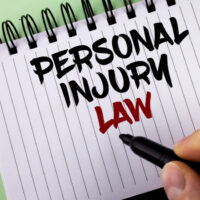“Fraud Upon The Court” In Personal Injury Cases

When you have been injured due to the negligence of another person, you may be able to file suit against that person and be awarded money damages for what you have been through. However, in a personal injury lawsuit, there are certain requirements that a plaintiff must meet in order for them to recover monetarily. One of them is informing both their attorney and any treating doctors about any past serious injuries or accidents they may have had, or that plaintiff risks potential “fraud upon the court” going forward.
Medical Information Must Be Complete
Personal injury cases in Florida are usually brought under a theory of negligence, which means that in general, four criteria have to be established in order for the plaintiff to prevail in their suit. The first is proving that the defendant owed a duty of care to the plaintiff – that is, that they were obliged to exercise reasonable care for the plaintiff’s safety. The second is a showing that the duty was breached. The third is establishing that the breach of duty was the direct cause of the plaintiff’s injuries – in other words, that nothing else played a role in harming the plaintiff. The fourth is establishing that the plaintiff actually suffered damages – specifically, the damages they claim to have suffered.
The most common way that the extent of a plaintiff’s physical injuries is discovered is via their medical records, submitted by the doctors who treated them. However, if the plaintiff has not informed their treating doctors of a past injury or accident, the doctors may not be able to give an accurate picture of the current injuries. This may make it seem like the plaintiff’s injuries are worse than they actually were, and that the defendant should be liable for more than they are. For example, if a plaintiff has a back injury, but was already experiencing back pain before the injury, they might recover for more damage to their back than was actually caused by the defendant.
“Sentiently Set In Motion”
Florida case law defines a fraud upon the court as any point where it can be demonstrated “clearly and convincingly” that a party to a case has “sentiently set in motion” an “unconscionable scheme” intended to interfere with the court and its ability to interpret the facts appropriately. It is important to keep in mind that the “clearly and convincingly” standard for evidence is very high – in other words, it takes quite persuasive evidence that a plaintiff is actively trying to defraud the court for a charge to stick, so to speak.
If the charge of fraud upon the court is upheld, your claim against the defendant will be dismissed, and it will usually be dismissed with prejudice. This means that it cannot be brought again – potentially depriving you of monetary compensation you may need to get your life back on track. It is crucial to be as open and honest with your medical history as possible, so that your treating doctors and your attorney have all the information they need to properly represent both themselves and you.
Call A Tampa Personal Injury Attorney
If you have been injured in an accident, and you believe that another person’s recklessness or negligence was the reason for its happening, filing suit against them may be the best way to get compensation for your injuries. However, you need to be transparent about any similar injuries in the past, or you may be shooting yourself in the proverbial foot. The Tampa personal injury attorneys at the Rinaldo Law Group are well versed in these cases, and will help guide you through the legal process and all the details. Contact our offices today for a free consultation.
Resource:
casemine.com/judgement/us/5914ecb2add7b0493494d4a0
https://www.tampainjuryaccidentlaw.com/should-i-file-for-wrongful-death-or-file-a-survival-action/
